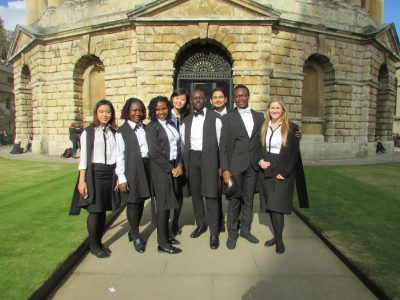Graduate Admissions Q&A

On 29 October 2020, the Africa Oxford Initiative hosted a Graduate Admissions Q&A. A wonderful panel made of current students, graduate admissions officers and professors answered questions that were sent to us from prospective applicants from across the African continent.
These are some of the top tips that emerged from the discussion.
1. Start your application early
Applications for admission into the University of Oxford open in September and, for most courses, close by January. Different courses may have different application requirements – so make sure that you’re aware of everything that you need to submit as part of your application.
An important part of every application to any course are the references. Starting your application early allows your referees to have enough time to write and submit your reference letter as well.
And while they are doing that, you can reflect on as well as edit and refine other components of the application like your personal statement, academic writing samples or research proposal.
2. You need excellent grades to be eligible. But you need to demonstrate more if you want to be a competitive applicant.
Your CV and your personal statement are an opportunity for you to demonstrate your expertise and to show how passionate you are about the subject. However, avoid using generic and stock phrases like “I have wanted to do this since I was 3 years old”. Instead, highlight the times when you have volunteered or participated in extracurricular activities to show that you are really passionate about the subject.
Make sure to include any practical experience and publications (including blogs and op-eds) that you may have written as well. Your personal statement must be unique to you. So, think carefully about your reasons for applying and what you hope to gain.
For prospective DPhil applicants, you can contact your potential supervisor before submitting the application. This first email is your chance to impress. Therefore, ensure that it is targeted, explains why you think that this particular academic is best suited to supervise you and describes your research interests well. But more importantly, the research proposal is a chance to show that you are capable of formulating a research plan. Give yourself enough time to do it properly.
3. Put your academic achievements into context
The people who are considering your application might not be familiar with the grading structures and systems of your university. Therefore, say something in your statement about the grading structure, the courses you took and where you ranked in the class as well as any prizes you might have won to put the grades on your transcripts into context.
Some universities may not award a lot of first class passes so someone who graduates with a strong upper second-class pass might be at the top of their class. If there is any material on the back of your transcript that explains how grading works in your university, make sure to include that in your application as well.
4. Begin your search for funding as early as you can
The majority of the funding in the University is automatic eligibility. This means that once you submit your application, you will automatically be considered for these scholarships – you don’t have to submit a separate application for these.
There are other scholarships that you do need to apply for separately. And you can find these by using the University’s funding search tool. Some scholarships have very early deadlines and may even close before the end of the University’s admissions cycle.
Do your research, take note of all the scholarships that you’re eligible for and prepare to make a strong application before the deadline.
5. Colleges
It’s worth taking some time to think about the college that you want to be in. Although colleges have a lot in common, there is some variation in things like where you can live, whether the college has funds available for fieldwork or has a gym onsite. Think about what you need or want as part of your Oxford experience and pick the college that would work best for you.
And mostly importantly, do not hold yourself back from applying! As our panellist Tatenda Magestsi (Zimbabwe, Masters in Public Policy & MSc African Studies alumni) said:
Find out more about the collegiate system and more details about the application process by watching the full Q&A on our YouTube channel: https://youtu.be/uzJqLzoFJQo
